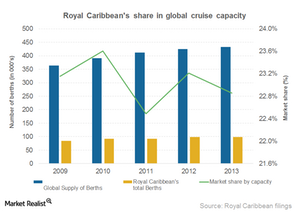Overview: Royal Caribbean Cruises, the 2nd largest cruise operator
Royal Caribbean Cruises, founded in 1968 and headquartered in Miami, Florida, is the world’s second largest cruise company.
Jan. 22 2015, Published 12:22 p.m. ET

Company overview
Royal Caribbean Cruises, founded in 1968 and headquartered in Miami, Florida, is the world’s second largest cruise company. The company operates 41 ships under six brands, Royal Caribbean International, Celebrity Cruises, Pullmantur, Azamara Club Cruises, CDF Croisières de France, and TUI Cruises through a 50% joint venture. These six brands provide a combination of contemporary and premium cruises to almost 490 destination around the globe.
The company also offers land tours in Alaska, Asia, Australia, Canada, Dubai, Europe, and South America. Each of the brands provides a range of activities, services, and amenities, including simulated surfing, swimming pools, sun decks, beauty salons, health clubs and spa facilities, ice skating rinks, rock climbing walls, golf courses, basketball courts, and a whole range of shopping, dining, and entertainment.
In 2013, the company carried around 5 million passengers. According to the company’s estimates, the cruise industry operated a total of 269 ships at the end of 2013 with an aggregate capacity of 436,000 berths. An additional 26 ships with a capacity of 71,000 berths are expected to be added between 2014 and 2018. As of December 31, 2013, Royal Caribbean operated 41 ships and had a total capacity of 98,750 berths or ~23% of the global capacity. Its itineraries ranged from two to 23 nights.
The company has maintained its share of global capacity between 22% to 24% for the past five years.
The competition
Royal Caribbean Cruises’ (RCL) primary competitors are Carnival Corporation (CCL) and Norwegian Cruise Line (NCLH). The PowerShares Dynamic Leisure and Entertainment Portfolio (PEJ) holds 5.5% in Royal Caribbean Cruises, 5% in Carnival Corporation, and 2.8% in Norwegian Cruise Line Holdings.
Other ETFs that hold stocks of cruise liners include the PowerShares Dynamic Large Cap Growth Portfolio (PWB) and theConsumer Discretionary Select Sector SPDR Fund (XLY).
Apart from other cruise liners, RCL also competes with land-based vacation alternatives throughout the world, including hotels, resorts, theme parks, organized tours, casinos, and vacation ownership properties.
